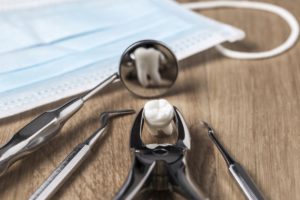 If you need to have a wisdom tooth removed, you can expect a short recovery. Depending on your situation, you may require a simple or surgical extraction. No matter the method, you’ll need to take it easy for a few days to ensure a quick recovery. Here’s how to care for your mouth after your extraction to avoid any complications.
If you need to have a wisdom tooth removed, you can expect a short recovery. Depending on your situation, you may require a simple or surgical extraction. No matter the method, you’ll need to take it easy for a few days to ensure a quick recovery. Here’s how to care for your mouth after your extraction to avoid any complications.
Simple VS Surgical Extraction
Not every situation is identical. Your oral surgeon will examine your mouth to determine which extraction method you’ll require. If you’re having more than 1 tooth removed, you may require a combination of both procedures, depending on your needs.
- Simple Extraction: A simple extraction is used when a tooth is fully visible above the gum line. Your oral surgeon will loosen your tooth and remove it with forceps.
- Surgical Extraction: If a tooth is partially or fully impacted, it must be removed surgically. Your oral surgeon will open your gum tissue to remove your tooth and then suture the extraction site closed.
Recovering from Wisdom Tooth Extraction
Typically, recovering from a simple extraction is easier because it is less invasive than a surgical removal. Nonetheless, your oral surgeon will recommend following specific aftercare instructions:
- Take Time to Rest: You’ll need to take it easy for at least 24 hours to allow the effects of sedatives or numbing agents to dissipate. You’ll also need to skip any strenuous exercises for about 1 week. Increased blood flow during exercise can heighten your risk of bleeding.
- Eat and Drink Carefully: Temperature check any foods or drinks to avoid accidental burns. Avoid anything carbonated, acidic, or spicy. Your oral surgeon will recommend eating soft foods for at least 2-3 days.
- Control Pain and Inflammation: Take any prescribed or over-the-counter pain relievers as instructed by your dental team. Apply cold compresses to reduce pain, swelling, and bruising.
- Protect the Blood Clot: A blood clot will form at the extraction site. If it is lost too soon, a painful condition called dry socket can occur. You can lessen the risk by not drinking with a straw. Do not rinse your mouth vigorously. Avoid touching the surgical site with your tongue or finger.
- Keep Your Mouth Clean: Avoid touching the surgical site when brushing and flossing. Rinse your mouth with salt water to kill bacteria and reduce inflammation. Rinse gently and let it flow out of your mouth into the sink.
- Avoid Tobacco and Alcohol: Smoking and alcohol can affect your body’s ability to heal and fight infections. They can also increase your risk of dry socket.
In no time at all, your mouth will be healed and you’ll be back on your feet. Maintain any follow-up appointments with your dental team.
About Dr. Amir Naimi
Dr. Naimi earned his dental degree at Virginia Commonwealth University and continued his education for 4 years at Tufts University, focusing on oral and maxillofacial surgery. He is qualified for many advanced procedures, like extractions and dental implants. Request an appointment through his website.
